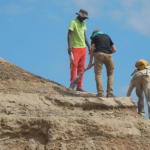Online harassment of girls is “so standard” that some parents see it as “normal”, a study has found.
Online safety charity Internet Matters found that 77% of girls aged 13 to 16 in the UK report digital experiences that are or may be harmful.
The survey also found that parents “are coming to regard online harassment of girls as normal – verging upon trivialising it”.
Carolyn Bunting, the charity’s co-executive, noted the majority of parents “are doing their best” to support their children but said she is concerned that “we’ve collectively lost sight of the fact that what is unacceptable offline should also be unacceptable online”.
Read more from Sky News:
Kids first see violent content at primary school – watchdog
Paedophiles using AI to ‘de-age’ celebrities
Brianna Ghey’s mum calls for phones made for under-16’s
A mother with a 15-year-old daughter said in an interview with Internet Matters that “dick pics” are “so standard it’s not noteworthy and they just block it and move on”.
She then went on to say her daughter “didn’t tell me, it has become a completely standard thing to happen to a teenager and I don’t think it has had a deleterious effect on her”.
Japan schools take action to tackle upskirting of cheerleaders at tournament
Spider: Play about drama school misconduct lifts curtain on trauma behind the scenes
Ambulance boss admits ‘much more’ to do after paramedics speak out over sexual harassment and misogyny
Another mother of a 17-year-old girl said her daughter had older men asking to be her “sugar daddy” on her modelling account on Instagram.
The teenager also told the charity that she saw sexual comments on a video of two 12-year-old girls, and said: “The whole comments section was being weird… they were young girls and fully clothed.”
The study was based on 12 in-depth interviews with teenage girls and parents, carried out from November 2023 to January 2024 by BMG Research.
Please use Chrome browser for a more accessible video player
In its report, Internet Matters called for a public campaign to “reset expectations about appropriate behaviour online” and for updated statutory guidance from Ofcom on reducing risks for women and girls.
It comes after the Internet Watch Foundation found that more than 90% of websites found to contain child sexual abuse featured “self-generated” images extorted from victims as young as three.
Be the first to get Breaking News
Install the Sky News app for free
The Online Safety Act – which was passed last year – requires providers of online services to minimise the extent of illegal and harmful content.
However, a parliamentary committee said that the benefit may not be felt for some time as full implementation of the law had been delayed until 2026.






















